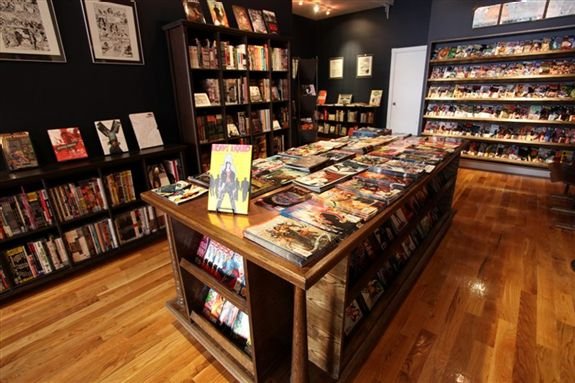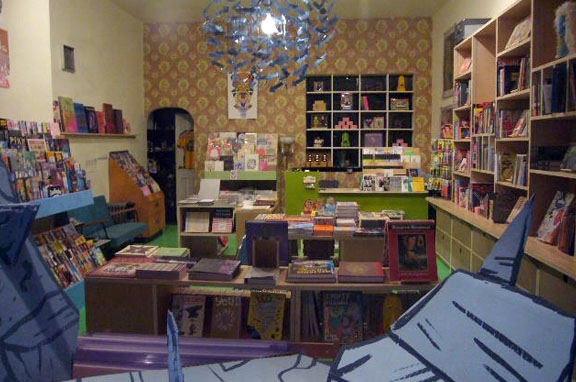I don’t believe the proliferation of digital comics sold on tablets will destroy brick and mortar comic shops. I didn’t used to, but I’ve changed my belief on the subject of the demise of the comic shops. Comic shops are not record shops, which they’ve been compared to and may not suffer the same fate. Many experts and fans have predicted that as MP3s decimated the CD retail market, so too the comic shops will fall because of comic apps. While there are similarities in their shared participation in the digital revolution, they are also very different markets. For one, comics are a much smaller industry. CDs had become wildly overpriced and many consumers grew to despise the record industry, feeling no guilt in stealing music from greedy corporations. Here’s a few reasons why I feel comic shops won’t be wiped out by apps:
1. Use: Relatively few people own the tablets to read comics on apps. Up until just recently, a tablet cost a minimum of $500. With the introduction of the Kindle Fire, the price drops down to $200, but they’re not for everyone. They’re buggy, awkward, and only 7 inches, which is too small to comfortably read a comic compared to the iPad. It will be several years until the devices are ubiquitous and as elegant (if ever) as the iPad.
2. Price: comics on tablets are not cheap. Unlike, MP3s, they are not perceived as being fairly price. Unlike ebooks, they’re not cheaper than their physical version.
3. Portability and Ownership: Digital comics can’t be moved from one app to another. They can’t be shared, and we don’t really get to own them, again, unlike their cousins the ebook.
4. The Artifact: So much of the activity at comic conventions has to do with signings. Many comic shops also have signings. Physical books are required for these signings to create a documented interaction between the fan and the book’s creator. The artifact, in this case a comic book, becomes a cherished item, a memento of a moment shared between the fan and the artist. There is a bond with the creator that many fans experience, which never fades. It is a connection with someone they admire, and they will remember it and speak fondly of it over decades. They can reach for the artifact, and show it to friends or simply look upon it in a quiet moment by themselves and recall the events that led to them attaining the prized signature. There is no such interaction with an app based comic.
So what’s wrong with so many of America’s comic shops? For one, they’re not in the comics business, they’re in the super hero business. The super hero business is strangling the comics business. Most comic shops (not all) in America are focused disproportionately on super heroes. Believe it or not, there are many people who don’t give a rat’s ass about anything that Marvel and DC are publishing. There are a lot of people out there who’d rather read about history, humor, fantasy, crime, mystery, sci-fi, young adult, horror, romance etc. While Marvel and DC may touch upon those categories, their primary thrust is super powered, costumed characters.That leaves the vast majority of potential comic readers with little to no reason to ever enter a comic shop.

Recently, I visited two comic shops that had a very small percentage of comics about super heroes — and the shops were busy, packed, thriving. The owners were friendly, enthusiastic, talkative, helpful. They carried graphic novels, trade paperbacks, obscure comics, weird comics, funny comics, comics for kids, comics not suitable for kids, arty comics, mini comics, indie comics, hardcover collections, comics by local artists, comics from abroad… Wow! I’m speaking of course of Brooklyn’s Desert Island Comics and Bergen Street Comics — two very different stores in appearance, presentation, and offerings, but similar that they both operate under the assumption that super heroes are only a tiny portion of what the public wants when it comes to comics.


While there are many innovative comic retailers around the country, these are the creative ones I’ve recently seen firsthand. I’ve been in many of the old model: dirty, sloppy, poorly lit, with their narrow-intrest inventory, and the sweatpants-wearing retailers who believe showering is optional. These shops are the sad temples of the all-boy’s club of nerd world. The artform of comics has been monopolized and ghettoized by the dorks for the past 30 years. It’s exciting to see pro-active shopkeepers re-inventing comic retailing for a new era of expanded customer base. One where females feel welcomed in by an attentiveness to detail and variety of genres. Where nerds and normals can shop under the same roof. Where comics are treated as literature rather than collectables.
It is the Bergen Street’s and Desert Island’s who are cultivating a clientele for the comic shop of the future, where super heroes are only one category in a wide variety of comic book offerings. Along with a customer friendly environment, special events, and ever changing displays and stock, these places become much more than comic shops. They are a part of a community, dare I say a scene. Super hero comic book sales in shops will diminish, and the smart retailers won’t try to make up for it with T-shirts and toys, they will make up for it by selling more comics to more different types of shoppers.